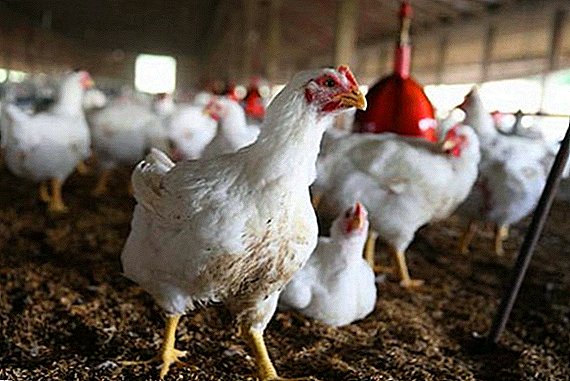
Growing poultry for meat and eggs has been and remains one of the top priority sectors in agriculture and animal husbandry.
Get quality products is impossible without proper care for pets. From the first days of life, it is necessary to provide the young growth with balanced feed in order to avoid the occurrence of diseases in poultry.
Various avitaminosis is considered one of the most common non-communicable diseases among chickens, turkeys and ducks.
This is a special condition of the body in which a lack of certain vitamins harms the health of the bird.
What is B6 vitamin deficiency?
 B6 vitamin deficiency is a deficiency of vitamin B6 (pyridoxine).
B6 vitamin deficiency is a deficiency of vitamin B6 (pyridoxine).
Vitamin B6 or pyridoxine in 1934 was discovered by P. György. In his research, the scientist determined that the substance contributes to the rapid elimination of dermatitis on the skin of laboratory animals.
Due to insufficient intake of pyridoxine in the body of a bird, the following processes dangerous for life and health occur.:
- violation of the regulation of the metabolism of fats, proteins and carbohydrates;
- violation of intracellular respiration;
- violation of the proper functioning of the nervous system.
Degree of danger
The danger of vitamin B6 deficiency is that treatment is not started on time. can lead the bird to death. In addition, the nervous and digestive systems of the body suffer, the growth and egg production of chickens is significantly reduced or completely stopped.
The most common beriberi B 6 is found in young animals. In addition to young stock, the population of laying hens can also be affected. This is due to their high need for vitamins and minerals.
Causes
 Avitaminosis B6 along with avitaminosis of other groups of vitamins are non-communicable diseases.
Avitaminosis B6 along with avitaminosis of other groups of vitamins are non-communicable diseases.
In the clinical picture of avitaminosis, a high body temperature is not expressed, and the course of the disease is prolonged. The absence of a specific pathogen does not facilitate the diagnosis of the disease.
At the first suspicion of avitaminosis, livestock breeders should promptly seek qualified assistance from veterinarians to avoid mass destruction of the poultry population.
The overall symptoms of avitaminosis in chickens are quite vivid.:
- noticeable lethargy and depression of the bird;
- disheveled plumage;
- pale earrings and comb;
- poor appetite;
- disruption of the gastrointestinal tract;
- slowing or stopping growth;
- reduced egg production.
Main symptoms
 Vitamin B6 vitamin deficiency in chickens can be distinguished by specific symptoms, expressed in the behavior and appearance of the bird:
Vitamin B6 vitamin deficiency in chickens can be distinguished by specific symptoms, expressed in the behavior and appearance of the bird:
- Peroz is observed.
- Pronounced convulsive movements during any movement in space.
- There are convulsions during which the birds flee aimlessly, flapping their wings.
- Characteristic signs of avitaminosis B 6 are falling chickens from one side to another, rolling on the back and twitching with the head and limbs.
- With vitamin B 6 deficiency in adults, there is a noticeable decrease in chickens hatching, weight loss and death.
As a rule, disease symptoms occur in chickens already one week after entering into the diet of feed poor in vitamin B6. The specific nature of the disease is that vitamin B6 deficiency leads to an increase in feed costs. This is due to a decrease in the use of amino acids in the process of protein synthesis in the body of a bird.
Diagnostics
In order to establish the diagnosis of avitaminosis B6, the veterinarian assesses the full clinical picture and analyzes the feed intake. To clarify the diagnosis, an autopsy of dead birds and their bacteriological examination are carried out.
According to the results of the examination, the veterinarian prescribed rational treatment.
Treatment
 Basically vitamin B6 vitamin deficiency in chickens is treated by taking measures to improve the living conditions of the birds and enrich the diet with essential substances.
Basically vitamin B6 vitamin deficiency in chickens is treated by taking measures to improve the living conditions of the birds and enrich the diet with essential substances.
By organizing competent bird care you can achieve good results. For a speedy recovery, the bird must be kept in a bright, well-ventilated room.
A prerequisite is the elimination of crowding during maintenance, the elimination of dirt, dampness and drafts. If possible, it is worth making a bird a place for walking and active movements.
For the treatment of beriberi B6 a good effect gives an introduction to the diet of poultry brewer's yeast at the dosage determined by the veterinarian. As a rule, experts prescribe 3-5 grams per bird.
In addition to the introduction of yeast, it is desirable to enrich the diet of chickens with green dressing and fortified fish oil. In severe cases, the introduction of the deficient vitamin subcutaneously in the form of injections will give a quick effect.
Prevention
First of all, pay great attention to the daily inspection of the bird. This practice makes it possible to detect weak and sick individuals in time.:
- assess the condition of the scallops;
- evaluate the skin;
- evaluate the eyes;
- evaluate the litter;
- evaluate the mobility of the bird.
In the absence of health problems, chickens are active, they eat and drink in moderation, feathers shine, the color and consistency of the litter are not changed.
 Secondly, a rational approach to the preparation of the diet of farmed birds. The diet should be changed depending on the time of year.
Secondly, a rational approach to the preparation of the diet of farmed birds. The diet should be changed depending on the time of year.
In the summer of vitamin fasting is eliminated by introducing a large amount of green food in food. The most valuable are considered alfalfa, clover, vetch, beet tops, quinoa.
Crushed herbs and green parts of plants are added to the food of the entire population. Especially important is such a vitamin supplement for laying hens and young animals. Chickens are given a green dressing for 3-4 days.
For chickens secured by walking, it is not necessary to introduce additional lure in the summer. In the cold season, when it is not possible to provide the bird with green food, feeds enriched with vitamins are introduced into the diet. In food add hay flour or hay leaf. The amount of feeding should be 5-8% of the daily nutritional value of the diet.
Silage (up to 50 grams per day), chopped carrots (up to 20 grams per day), sprouted grains (up to 20 grams per day), as well as yeast and bran cereals are suitable for enriching the feed with vitamins.
 Bress-Gali chickens with their bright white plumage are capable of enriching any household, thanks to their egg-producing qualities.
Bress-Gali chickens with their bright white plumage are capable of enriching any household, thanks to their egg-producing qualities.About avitaminosis B2 in chickens, read here: //selo.guru/ptitsa/kury/bolezni/narushenie-pitaniya/avitaminoz-b2.html.
For vitaminization of food, you can use drugs manufactured by the pharmaceutical industry. They are presented in the form of solutions or dragee. An excellent supplement to the diet will be fortified fish oil dosage up to 10 grams. per day.
Conclusion
In conclusion, it is worth noting that avitaminosis of various etiologies cause significant damage to livestock breeders. Despite the severity of the disease, to avoid its occurrence will help the right care and well-composed diet. We should not forget about the prevention and daily monitoring of the state of the livestock - both young and adult chickens.
A healthy bird is growing rapidly and is distinguished by high egg production, which cannot but increase the economic efficiency of the poultry industry.












